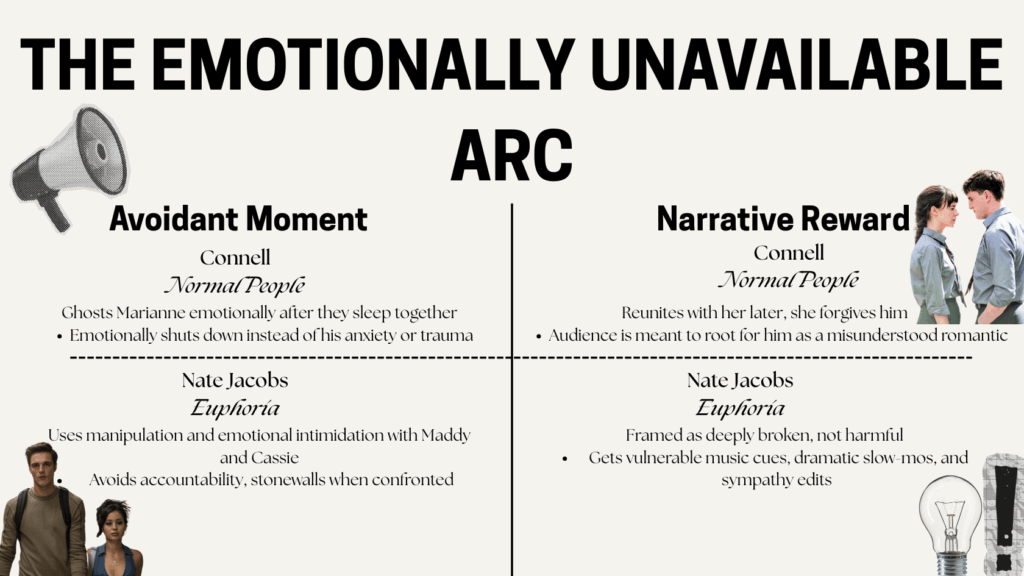Why do we keep falling for emotionally unavailable men on screen? The ones who can’t communicate, won’t commit, but still get framed as the romantic ideal? Here, Unglossed unpacks the psychology behind the trope, how it messes with our real-life expectations, and why it’s time to break up with the fantasy.
From Normal People’s Connell Waldron to Euphoria’s Nate Jacobs, emotionally avoidant men have become pop culture’s favourite heartthrobs. They rarely speak, struggle to say how they feel, and flinch at vulnerability… yet we act like their silence is a love letter in disguise.
But what exactly is so sexy about emotional repression? Why do we romanticise men who can’t communicate? And why are we so convinced we can fix them?
Because behind the fan edits of Connell Waldron and thirst tweets for Nate Jacobs, there is a clear pattern that people seem to overlook: this man is emotionally avoidant. Gemma Nice is a sex and relationship coach who explains what that means in relationships. “Emotionally avoidant people tend to shy away from closeness or intimacy for fear of getting hurt.
“They may also avoid emotional conversations and connections which might mean they shy away from relationships which need a deeper level of connection. They can’t open up to their partner and struggle to express how they feel, so if they come across a difficult situation, they may steer clear and put their own needs before their partner.”
So in other words, they don’t just fear vulnerability…they run from it.
These characters are often rooted in avoidant attachment styles, developed when a child’s emotional needs weren’t consistently met by caregivers. “They become hyper-independent,” Gemma adds. “They don’t learn how to open up, so as adults, they struggle to let partners in.”
On screen, their emotional distance doesn’t come off as a red flag, it’s framed as depth. His silence isn’t cold, it’s misunderstood. His mood swings aren’t emotional immaturity, they’re poetry. It’s not that he can’t say how he feels… he’s just never met someone like you before.

These men are rarely the ones offering safety, communication, or care. And yet, in the world of TV and film, they’re always framed as the most desirable. The question is… why?
Let’s be honest: part of us knows the emotionally avoidant man is a terrible idea. He’ll leave you on read, deflect every heartfelt conversation, and probably disappear the second things get too real. But another part, the irrational, dopamine-fuelled part, still clings to the idea that ‘maybe this time’, it’ll be different.
So why are we drawn to these men, even when we know how the story ends?
According to Gemma, it all comes down to familiarity. “It brings them back to their childhood memories where there may have been inconsistent love or attention. They are seeking comfort rather than seeking love which may not be there. If their partner is emotionally unavailable, they can feel safe knowing they don’t need to get close to this person because their guard is up and they can’t let it down just yet.”
It’s a pattern rooted in attachment theory. If someone grows up having to work for affection, emotional unavailability can feel weirdly safe. You know how to navigate that space. You know the push and pull, the guessing games, the small moments of validation that feel huge simply because they’re rare. So when a character mirrors that energy, holding their cards close, pulling away when things get intimate, we don’t run. We lean in.
And it’s not just familiarity, there’s also the thrill of it. Society tells us that the harder something is to get, the more valuable it must be. Emotionally avoidant men are framed as a challenge, someone you have to earn. “Hard-to-get partners are seen as desirable,” Gemma says. “It might feel exciting at the time, because you’re chasing that person.”
And when the chase finally ends, when he opens up, even just a little, it feels like a win. Like proof that you were special enough to reach the part of him no one else could.
The reality? It’s more often a trauma bond than a love story. But it doesn’t stop us from pressing play on the next emotionally unavailable man anyway.
It’s clear that we don’t just watch these men, we want to save them. The emotionally avoidant man isn’t just seen as sexy because he’s mysterious. He’s desirable because he’s broken. And if he’s broken, we get to be the ones who fix him.
Pop culture doesn’t just normalise this dynamic, it glamorises it. From Bella Swan begging Edward to stay (Twilight), to Marianne trying to understand Connell’s silence (Normal People), we’re taught that love means waiting, healing, and enduring.
Sociologists call this the ‘fix it fantasy’, where someone believes they can change or heal a distant partner, and Gemma explains why this concept is so appealing. “It makes us feel wanted or needed,” she explains. “We feel better and have a better self-worth from when we fix or rescue others from their trauma. It makes you feel good, which can be particularly strong when people have grown up in an environment where they needed to ‘fix’ certain situations to get their needs met.”
But in real life? Waiting for someone to change rarely leads to anything but disappointment… and an entire therapy bill of your own.
So what is the danger of romanticising these emotionally unavailable men in TV and film?
“Pop culture makes emotional unavailability look desirable,” says Gemma. “This can lead to misconceptions about what a healthy relationship actually looks like.” The result? We confuse distance with depth, thinking that if someone finally opens up after shutting us out, it means we’ve earned their love.
These characters are rarely shown doing real emotional work, yet when they offer a single heartfelt moment, like a kiss in the rain or a late-night confession, it’s treated as the ultimate romantic gesture. Viewers, especially younger ones, absorb that message: that love is something you chase, and emotional breadcrumbs are enough.
It’s a dangerous script. It teaches us that relationships should feel like a rollercoaster, and that the more anxious we feel, the more meaningful the connection must be.
Take Nate Jacobs in Euphoria or Joe Goldberg in You – characters who are violent, possessive, and emotionally volatile, yet still framed as complex or romantic. Viewers may root for their redemption, mistaking toxicity for trauma, and this kind of storytelling can desensitise us to harmful behaviour.
But that’s exactly the problem… when pop culture keeps feeding us stories where love means waiting, fixing, or aching, we’re obviously going to start to believe that’s what love is.
We’ve been sold the idea that love is earned through patience. That if we stick around long enough, break down enough walls, and offer enough comfort, the emotionally unavailable man will finally choose us and that it’ll all have been worth it.
But maybe it’s time we let go of the fantasy. The emotionally unavailable man doesn’t need your love story, he needs therapy. And you? You deserve more than a sad boy with bad communication.











